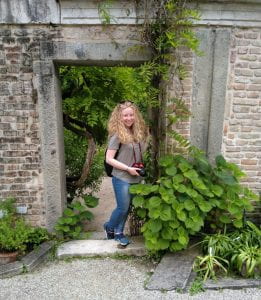Check out the following post from Peer Advisor Chrissy House (CCAS ’20)!

I’ve spent the last four years facing the infamous “exchange of glances” when I tell people I’m majoring in Creative Writing and English, the glance which means, “Ah, another unemployed English major will soon be released into the world.” And though I have long fallen victim to those glances and often worried for my future, I have an offer of employment for after graduation: an employed English major soon to be released into the world. As the picture I chose to accompany this post signifies, there are some doors you might not see at first glance, but once you push past the undergrowth and daunting requirements lists, you will find the door open to you. Don’t be discouraged from pursing opportunities for which you feel underqualified, apply and you may be pleasantly surprised.
I found myself in a similar position last year when my major advisor pushed me to apply for the GW Undergraduate Research Fellowship. I felt unqualified to pursue research in a sea of SEAS students—what does humanities research even entail?—but decided, what the heck, I’ll apply. I continued to feel unsure of myself as I chose a topic and wrote my research proposal. A section of the application asked about my previous research experience, a field in which I continued to feel underqualified. I’d done an extensive research project in high school on utilizing native pollinators in the face of dwindling honey bee populations, but that had been scientific research, and since coming to college, my only research had been research papers for German history and literature classes, which consisted of reading books and journal articles.
My major advisor and faculty mentor read five different drafts of my application until we were all satisfied. Subtle plug here for utilizing GW staff! I got more excited about the project as we discussed different directions my research could take—beyond just reading books and journal articles, my research proposal included taking advantage of my semester abroad in Germany to further my research on playwright Friedrich Schiller by attending modern productions of his plays and visiting museums and Schiller cultural sites in Germany. And as I got more excited about the project, I began to look at how my past experiences could benefit my application, instead of just seeing how few experiences I’d had. My research in high school prepared me to identify experts and reliable sources, taught me professional email skills for contacting experts in the field, and gave me practice in preparing for and conducting interviews with professionals. Additionally, my prior experiences required me to hone presentation skills that would benefit me in preparation for GW Research Days. My German papers here at GW had already exposed me to German music and cinema, so I wasn’t entering the theater sphere completely ignorant of German culture.
The conclusion of the fellowship saga, as I’m sure you guessed, is a positive one: I received the GW Undergraduate Research Fellowship. I travelled all over Germany seeing plays and visiting museums, an experience I likely wouldn’t have had without the fellowship. I continued my research upon returning to GW and transitioned the fellowship into my Senior Thesis.
What I’m trying to say here is don’t sell yourself short. Even if you feel underqualified, apply for that internship, fellowship, or job; don’t be afraid to take a chance on yourself. Find the strengths in your experiences that will make you a better candidate and highlight them. Believe in yourself. If this English major can get a job, so can you.
